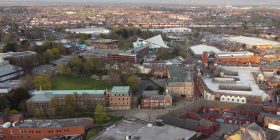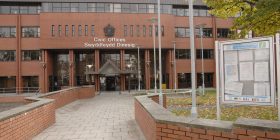Arthur – A Leader For All

The legends surrounding King Arthur have broad appeal today, and it seems that that has always been the case.
The audience at the recent launch of Bangor University’s new Centre for Arthurian Studies learnt that, whether he existed or not, the legendary king, or leader of men, has been appropriated by cultures across Europe and down the ages, and has served many different purposes.
Dr Aled Llion Jones, of the School of Welsh and Deputy-Director of the new Centre reminded the audience that the earliest Arthurian literature is in the Welsh language. Early manuscripts such as the Black Book of Carmarthen, the Book of Taliesin and the Red Book of Hergest outline the ‘Welsh Arthur’, a leader of men with roots in the ’Old North’ – now the north of England. Arthur’s legend is also strongly connected with modern north Wales – from Dinas Emrys where Merlin first prophesied that Arthur would rise, to places such as Llyn Llydaw or Llyn Ogwen in Snowdonia, one or other being possibly the lake to which Excalibur was finally cast. He remains in the popular imagination as a leader who has no grave, but who sleeps – perhaps on Ynys Enlli (Bardsey) – to return one day.
Aled Llion Jones says: “Though Arthur clearly belongs to Wales, its language and landscape, it’s no bad thing that the Arthurian tradition has been shared among many cultures.”
Emeritus Professor Peter Field, who edited Thomas Malory’s edition of Arthurian legends which became a valuable source material for other re-tellings of the Arthurian legends, discussed Malory’s original sources for the Round Table
In her inaugural Professorial Lecture, which formed part of the launch, Raluca Radulescu, founding director of the new Centre at the School of English Literature, and specialist in the English literary and historical retellings of the Arthurian legends, discussed a ‘portable Arthur’. She looked at the different ways that the Arthurian legends have become portable, from the earliest devices- medieval genealogical rolls, pocket books of the Arthurian tales for gentlemen, or much larger tapestries which were taken from court to court, to how the legends have become ‘portable’ across cultures and ages.
Prof Radulescu said: “Though the legends contain stock values and provide morality lessons or role models for their audiences or readers, Arthurian literature has provided a range of symbols which have been reinvented and reinterpreted by successive generations.
“It was the Anglo-Normans who gave Arthur the title of ‘king’ rather than of war leader, while, in the later medieval period, Arthur and his knights were used to represent the ‘courtly tradition’ and to provide an example of how the gentry should behave in the inter- war years. In Middle-Dutch and medieval Italian re-tellings we find a fantasy world which is used as a means of discussing contemporary issues in their respective societies.”
As well as teaching the world’s only MA in Arthurian Literature, Bangor University has a long-standing international record of excellence in research, teaching and engagement in the area of Arthurian Studies that goes back to the foundation of the University and the University Library in 1884.
The University also houses a large collections of books relating to Arthurian literature, including some rare examples of sixteenth- to nineteenth-century editions of original texts as well as contemporary retellings. Bangor University scholars play a central role in the International Arthurian Society and a number of very popular local school and community events have been organised in collaboration with the Widening Access centre and the College of Arts and Humanities in recent years.
Spotted something? Got a story? Email News@News.Wales











